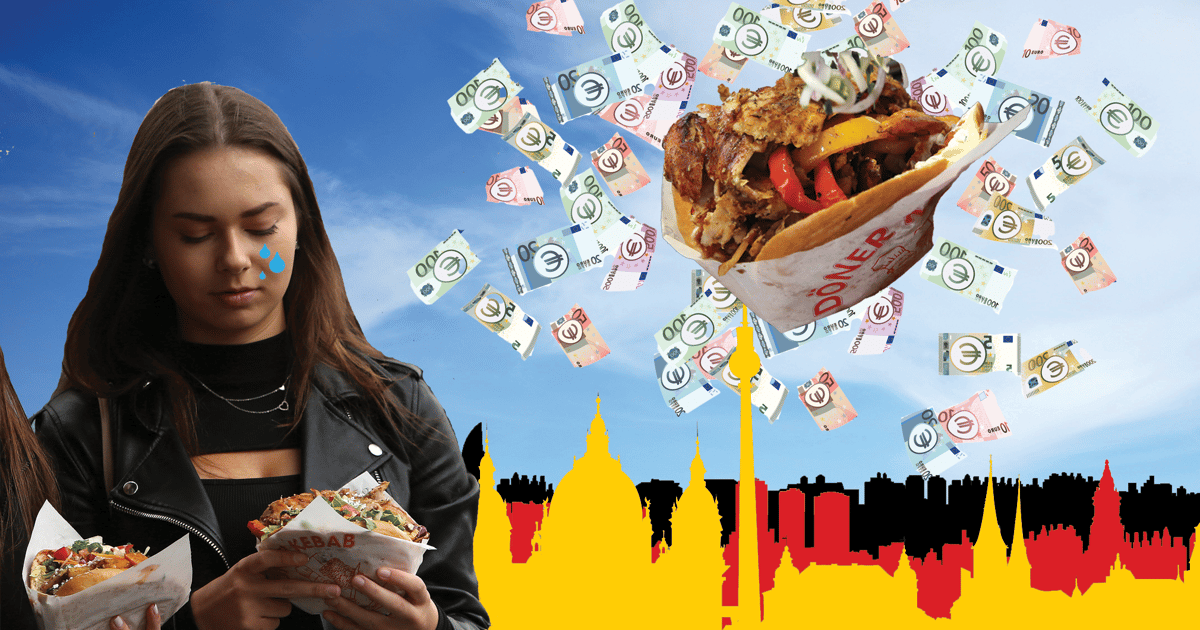- cross-posted to:
- europe
- cross-posted to:
- europe
“I can still remember when doner kebabs were sold for €3.50,” reminisced one teenager amid calls for a price brake to stop rising kebab costs.
The German capital is the birthplace of that ubiquitous European fast food, the doner kebab, and it shows.
Kebab shops line streets of many German cities, particularly in Berlin, and the scent of roasting, skewered meat is never far off.
Some two-million doner kebabs — meat wrapped in bread, topped with sauces and vegetables — are consumed a day in Germany, according to an industry association, quite a lot for a country of 83 million people. And the doner kebab has even supplanted the old stalwart, the currywurst — fried veal sausage topped with ketchup and curry powder — as the most popular fast-food dish in the country, according to a 2022 survey.



The original Turkish Döner Kebab comes on a plate, not in pide or dürüm, nor would Turks ever really entertain the idea of putting Tsatsiki or any sauce on meat, and you’ll also be hard-pressed to see them eat cabbage.
Meanwhile you’ll be hard-pressed to see Germans eat meat without sauce, and various forms of cabbage-containing salad are very popular.
The Döner in its German form is Turkish-German fusion food. It could not have occurred without two culinary traditions meeting. Heck, the name isn’t even grammatical in Turkish. The meat, both style and preparation and spices, is 100% Turkish, the bread is Turkish-inspired but underwent German bread engineering, the rest is either native German or previous imports: It really is Tsatsiki, not Cacık. No dill, no mint, and no water. If you want diluted yoghurt you can have Ayran.
If you nowadays see German-style Döner in Turkey then that’s because the idea has been re-imported.
Both Döner and Kebab are words that passed into English and other European languages from Turkish. Importing these words to form an ungrammatical phrase is a feature of borrowing words from another language. While the new word, and new food, may be considered a word of the importing language, as many English and German words are, they are never considered the origin or birthplace. Same goes for food.
With this logic of changing something on top of the same base thing a calling it originating in a new country already shows itself as contract manufacturing, and many would considered slapping a Made in the U.S. label while all the work except a laser logo engraving comes from somewhere else a malpractice and marketing customarily, although it is legal.
With the same logic, one can even go as much as culture-stealing with calling all the damaged cultural heritage in the British museums a British artifact, since they are no longer the same artifact they were in their homelands. Hell, lets go even painting these old statues with modern paint practices and call them originating from wherever they are painted.
Origin is something, cultural assimilation in a neutral connotation is another.
Dude noone in Germany is denying the Turkish roots of Döner and neither is the Politico article.
Americans eat Hamburgers. That’s a Fischbrötchen with the fish replaced with unseasoned Frikadelle, doused in that ketchup of theirs. I can tell you, with absolute authority, that Hamburg doesn’t claim to have invented it, at least not in the form that the US and the world knows it. The utmost claim is that HAPAG served Frikadellen (proper ones with onions and everything) in buns on their emigration ships to the US to save on dishwashing costs while making sure people would be fit enough to get past Ellis Island (there was a return trip and money back guarantee).
So, stop it. Or I’ll call Raki an Ouzo ersatz.
Call it whatever you want, my energy to protest against western media’s bias in what to call with bad connotations, whom to call terrorists, which European country to attribute what popular thing, what topic to underreport has its limits and I have hardly any tolerance left to discuss the sidetracking details about this.
Nah your energy is to be as offended as possible to feel as superior as possible.
Also have you ever analysed the coverage of Northern Ireland in Rwanda’s press. Selective reporting! Selective reporting!
You got me, congrats. I’m a bad offended guy. A snowflake. A self-made victim. I should stop talking and let the respectable media sing praises and make you happy now. Bye.